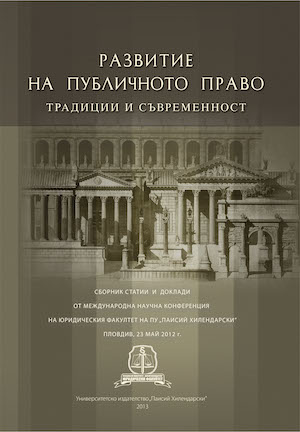Един пример за принудително отчуждаване от епохата на Римсната република
An example for expropriation of property from the epoch of the Roman republic
Author(s): José Miguel Piquer Marí, Juan Alfredo Obarrio Moreno
Subject(s): Law, Constitution, Jurisprudence, Civil Law, Roman law
Published by: Пловдивски университет »Паисий Хилендарски«
Keywords: expropriation; property; Roman republic
Summary/Abstract: The topic of this article is related to one of the first reliable data given by Livius (Liv. 40.29.3) for the existence of the compulsory expropriation as an institute known even in the archaic epoch which can be defined as an act of property deprivation against the will of its owner. The article analyses the case with the manuscripts (the so called “Libri”) of the roman rex Numa Pompilius which have been found in 181 B.C. under the Ianiculum hill (sub Ianiculo). The expropriation and destruction of these manuscripts that has been ordered by the praetor is related to a research of the preconditions regulated in the Roman law for such an act of expropriation as well as with the public interest revealed in the case with regard to another private interest in which it enters in to a conflict. This conclusion allows a concentration of the attention on the main elements which allow for the qualification of such acts as expropriation ones and not as purely confiscatory. The ideological, economical and social changes in the domain of compulsory expropriation which form the historical and cultural situation in a certain society have to be taken into account. The acts of the praetor are predetermined by an evaluation of the manuscripts’ content which although created by a Roman rex and containing the historical memory of the Romans have to be destroyed. The reason for that destruction is that the knowledge that they contain may pose a danger to the state religion, the belief in Gods and their religious will. The praetor takes also into account that these books may also diminish the ability of the political organs to take decisions which according to the religion at the beginning of the II century. B.C. are based on the God’s will.
- Page Range: 37-60
- Page Count: 24
- Publication Year: 2013
- Language: Bulgarian
- Content File-PDF

